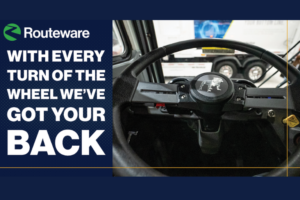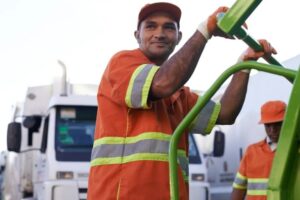As many municipalities continue to grapple with pandemic fallout and the ongoing driver shortage, solid waste departments that invested in smart truck technology years ago find themselves reaping the benefits a second time.
Not only does fleet automation streamline operations and save labor hours, making even the leanest teams more effective. It also enhances communication between drivers and office staff, and between office staff and customers. Working from one set of verifiable data in real time cuts down on confusion and enhances service. Plus, in many cases, fleet automation saves a whole lot of paper.
Until 2013 the Municipality of Anchorage’s solid waste program was “old school,” says Evalu Filitaula, general foreman of refuse collection.
With 30 trucks providing residential and commercial services, the Municipality hauls garbage, recycling, glass, organics, and business waste.
Filitaula has worked for the Municipality since 2005. With experience as a truck operator and swamper, he was the first field supervisor for refuse collection, assisting drivers and serving as the “public face” of solid waste, before taking on his current leadership role.
“Back then, our routes were on a paper book,” he says. “You would scribble on it, make a checkmark, and document whatever issues you might come across, like cart not out, or a vehicle in the way. Everything was done by hand.”
While drivers did an excellent job of running their routes and collecting information — “we rarely missed any stops” — the legacy process wasted paper and time. And it created duplicate work, Filitaula says.
Per day, the paper-based routing method used more than a ream of paper. Plus, paper documentation made it difficult to respond quickly to customers who called about a collection while the driver responsible for their service was still completing their route.
Paper note-taking also created double the work: Drivers took time to jot down notes along their routes, then handed off those route sheets to someone else, whose job it was to type the information into a database.
“With paper, we were printing 500 or 600 pages a day. It could take a half an hour to print these out, so we would have to plan and print the books the day before. And then, if there were updates to a stop, we (the drivers) would make notes. At the end of the day, we would return our books to a supervisor or customer service. They would have to review our books because drivers marked everything in them by hand. This meant any changes couldn’t be noted to an account till the end of the day, and multiple people were trying to enter all the documentation. This was very time consuming. We thought, there has got to be an easier, quicker way to do this!”
The Municipality turned to Routeware in 2013.
“Now we save paper and service our customers more efficiently with on-board computers,” he says.
The Municipality uses tablets in trucks to deliver route information; provide seamless, real-time communication between drivers and dispatchers; and to collect information about what’s really happening on the street in concert with truck cameras and radio-frequency identification technology.
“The communication between the truck, the operator, and customer service — it’s a lot more efficient now,” Filitaula says. “Customer service can actually pull up on their screen when a customer calls with an issue or a missed stop — or if they forgot to pull their can out. We can call the driver to let them know that a customer has a special request. We also can send an actual work order to the truck.”
In addition, Routeware’s reliable RFID collection data allows customer service to verify collection with certainty.
The increased efficiencies of automation helped the Municipality launch and scale a new organics collection program, too — a need they hadn’t identified when they implemented smart truck features nearly a decade ago.
“The tablets work great for us. This is one of those great technologies that change the way we do things,” Filitaula says. “It’s efficient and effective, and it works to save time and money. It’s a new way of picking up trash.”
Learn more. Check out our Success Stories to learn how our customers serve their communities by providing essential waste and recycling services that protect our planet.a





